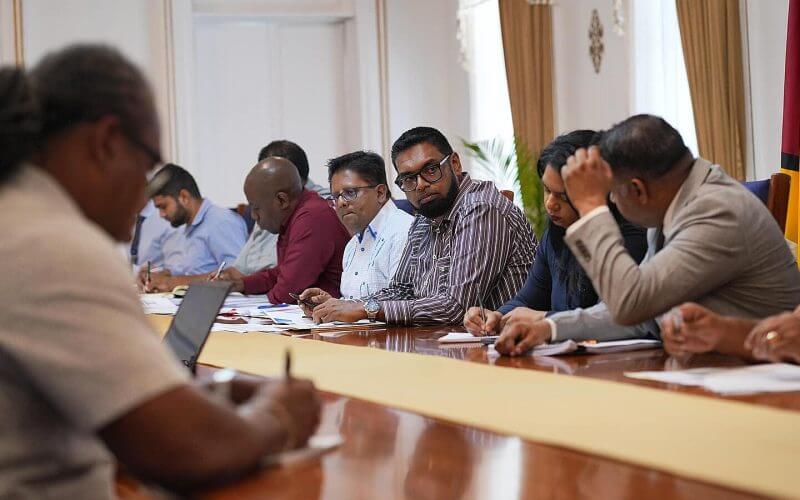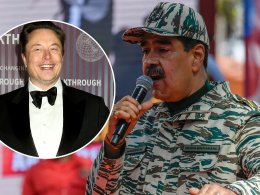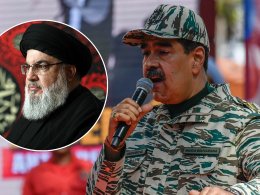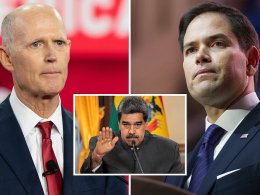The U.S. has announced joint military flight drills in Guyana after communist dictator Nicolas Maduro threatened to invade its oil-rich neighbor.
The news comes as Brazil has also begun deploying troops to the Venezuelan border and the U.N. Security Council called an urgent meeting in hopes of quelling the South American tensions.
The shakeup in South America is the result of Maduro’s decision to hold a referendum, asking his citizens if they believe their country has legitimate rights over the oil-rich Essequibo region, which has been administered by Guyana for more than a century, but claimed by Venezuela for decades.
Maduro, who has a record of using pressure tactics to get favorable voting results in the 90-percentile ranking, secured a 95% affirmative result in a five-question survey that he now asserts gives him a mandate to invade his neighboring country.
Some experts have asserted Maduro’s real intent is to use the prospect of war to distract the Venezuelan public from other issues since he has been losing popularity and is under pressure to hold democratic elections with international observers.
“In collaboration with the Guyana Defense Force, the U.S. Southern Command will conduct flight operations within Guyana on Dec. 7,” the U.S. Embassy in Georgetown said in a statement.
The statement also said the U.S. military flights are part of “routine engagement and operations to enhance security partnership” with Guyana.
Still, the flights will undoubtedly send a message to Guyana’s communist neighbor that it has the protection of the United States.
On Friday, the U.N. Security Council will meet in New York behind closed doors to discuss the matter, according to an official schedule.
In a letter, Foreign Minister of Guyana, Hugh Todd, the, requested that the Security Council “call urgently for a meeting” to discuss “a grave matter that threatens international peace and security.”
Todd asserted that Maduro’s suggestion at invasion “plainly constitutes a direct threat to Guyana’s peace and security, and more broadly threatens the peace and security of the entire region.”
The United States, however, is not the only country in the western hemisphere coming to Guyana’s aid.
Brazilian president Luiz Inacio Lula da Silva also expressed “growing concern” about Maduro’s referendum and has begun deploying troops to his country’s northern border.
“If there’s one thing we don’t want here in South America, it’s war,” he said at a recent summit of the Mercosur regional bloc.
The Brazilian army on Wednesday said that it was fortifying troop positions in the northern cities of Boa Vista and Pacaraima as part of efforts “to guarantee the inviolability of the territory.”
The decades long dispute between the two countries over the oil rich Essequibo region is significant since that area is home to 125,000 of Guyana’s 800,000 citizens and covers about two-thirds of the country’s territory.
While the dispute between Guyana and Venezuela has gone on for decades, tensions heated up dramatically in 2015 after oil was discovered off the Guyanese coast in 2015.
Maduro’s referendum vote was held on Sunday amid litigation in the United Nation’s International Court of Justice (ICJ) in The Hague.
That international litigation will purportedly determine where the borders should be divided and recognized by the international community, but Maduro’s communist regime has said it does not recognize the ICJ’s authority or jurisdiction in the dispute.
ADN reported on Monday that Guyana is not taking Maduro’s threats lightly or cowering.
The country’s president, Irfaan Ali, immediately addressed his citizens in a rally held in the nation’s capital at a stadium in which he said there was nothing to fear.
Hundreds of Guyanese citizens came to support their president and passionately waved flags in support of their homeland.
To ease concerns, U.S. Secretary of State Antony Blinken also called Ali on Wednesday and said Washington stands with the South American country.
Blinken said Washington wanted a peaceful resolution and offered America’s “unwavering support for Guyana’s sovereignty.”
Guyana declared its independence in 1966 after it was both a British and Dutch colony dating back to the 19th century.
Its dispute with Venezuela dates back decades. Guyana asserts that its Essequibo region was already determined by an international arbitration panel in 1899, but Venezuela refuses to accept that ruling.
Instead, Caracas has relied on natural borders, insisting that the Essequibo river to the region’s east forms a natural border that was recognized since the days of the American Revolutionary War in 1777.
As a result of Maduro’s Sunday referendum, the Venezuelan legislature proposed a bill on Wednesday to annex the Guyanese territory and even ordered its state-owned oil company to issue licenses to begin extracting crude oil there.
Maduro then warned oil companies working in the region and ordered them to halt drilling operations, a move that Ali called a “direct threat” against Guyana.
Ali has placed his armed forces on “alert” and addressed his nation on Tuesday, assuring his constituents that the United States and other “partners” were on call to help defend their sovereignty.
Guyana’s armed forces were on “alert,” Ali added in a rare address to the nation late on Tuesday and were in contact with “partners” including the United States.
Meanwhile to the south, Lula’s Brazilian military has begun moving armed vehicles and started deploying troops to the border city of Boa Vista, the capital of Roraima state.
Brazil’s move could cause Maduro pause before launching an attack, especially since harsh terrain would most likely force Venezuelan troops to enter Essequibo through Brazil.
Brazil's armed forces has said it is fortifying its presence there as part of an effort to "guarantee the inviolability of the territory,” according to AFP news agency.
The name “Guyana” means the “lands of many waters.” It is known for its beautiful waterfalls. The Kaieteur Falls, located in the country’s Potaro River, is the world’s largest single drop waterfall.
Related Story: Cuban and Venezuelan Dictatorships Meet with Russia for Security Force Cooperation










